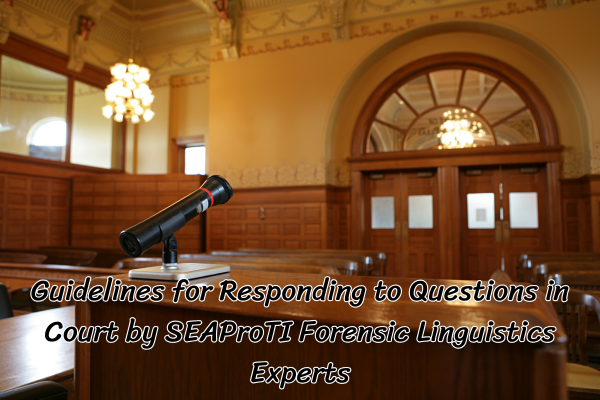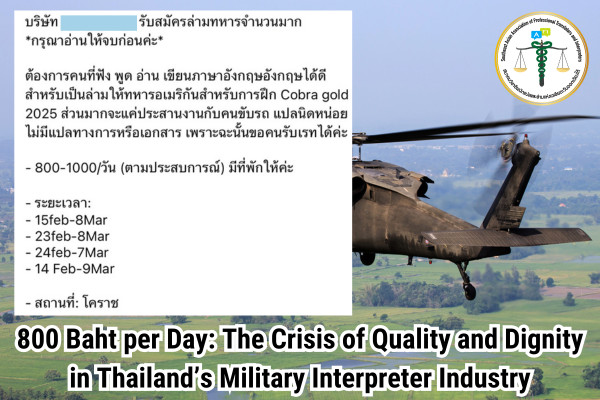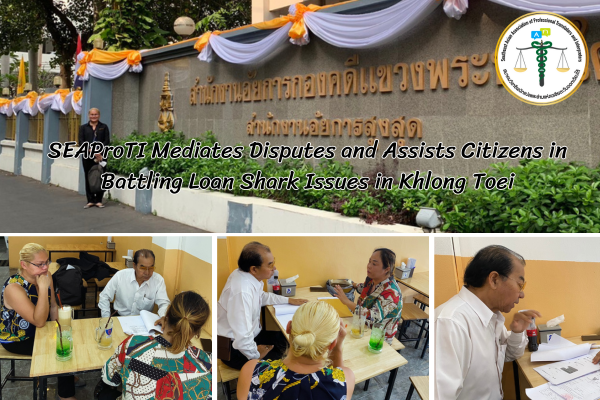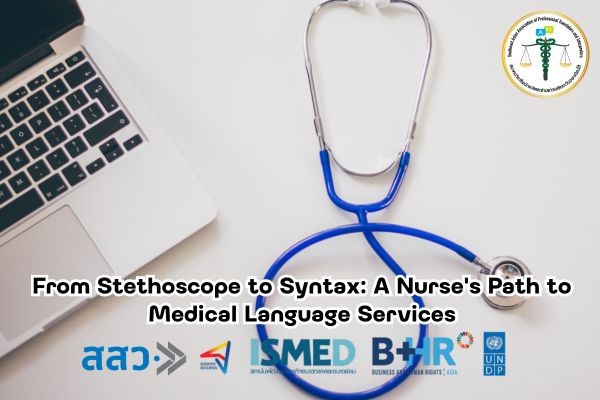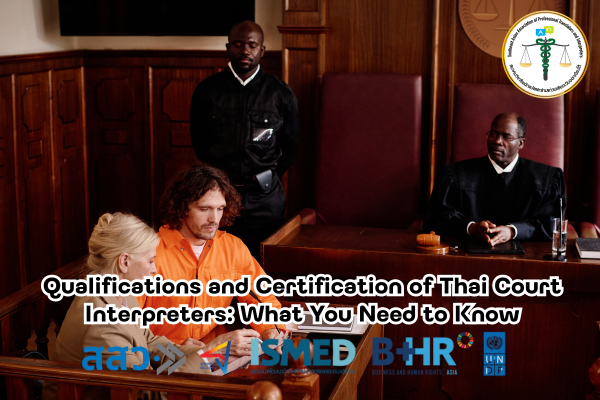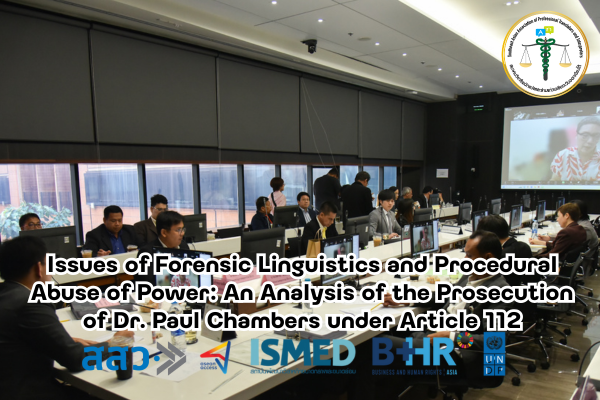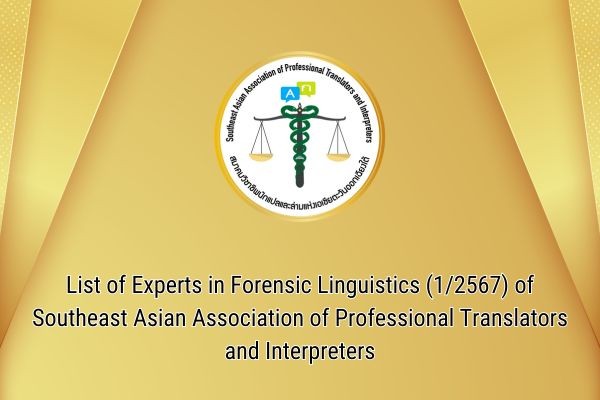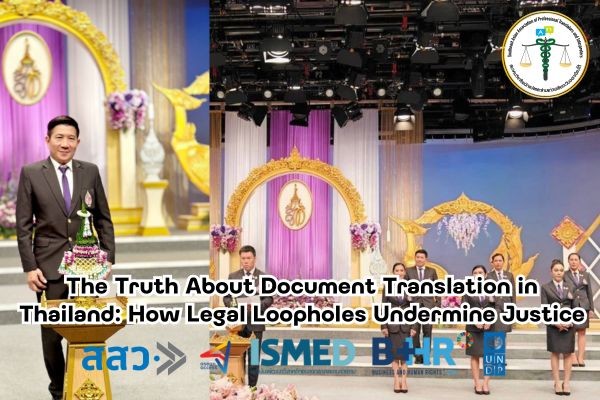Guidelines for Responding to Questions in Court by SEAProTI Forensic Linguistics Experts
When someone is invited or subpoenaed to serve as a witness in court, whether willingly or not, being prepared to answer questions during the legal proceedings is of utmost importance. Preparing to respond, especially to cross-examination by the opposing counsel, is crucial to avoid mistakes that could affect the case or the credibility of the witness.
Forensic linguistics experts from SEAProTI recommend four key principles that witnesses should follow when answering questions in court to ensure their testimony is accurate and credible:
1. “I Don’t Know” (Only Respond to What You Truly Know)
The phrase “I don’t know” does not mean the witness should refuse to answer all questions. It means responding truthfully based on what the witness has directly observed or knows. If the witness has no knowledge of the matter being questioned, they should not attempt to answer.
Example:
-
In a loan case, if the witness did not see the actual transfer of money, they should not confirm that the transfer occurred merely to support their side.
Answering questions without knowledge or by guessing could lead to conflicting information, damaging the witness’s credibility and potentially affecting the case. The key is to “only answer what you know for certain.” If you don’t know, simply state, “I don’t know.”
2. “I’m Not Sure” (Respond Cautiously to Uncertain Details)
If the witness observed the event but is unsure about certain details, such as due to the passage of time or because the event happened too quickly, they should state, “I’m not sure,” and explain why.
Example:
-
In a murder case, if asked, “Was the defendant holding the gun in their left or right hand?” the witness might respond, “I’m not sure because the incident happened so quickly.”
Precaution: Answering uncertainly but giving definitive responses may result in contradictory information, harming the witness’s credibility and the case.
3. “I Don’t Remember” (Admit When You’ve Forgotten Details)
If the witness once knew about the event but has forgotten the specifics due to the passage of time or lack of attention, they should respond, “I don’t remember,” and explain why.
Example:
-
In a loan agreement case, if asked, “Was the agreement signed at the dining table or outside?” and the witness cannot recall, they should respond, “I don’t remember because the incident occurred many years ago,” instead of guessing.
Key Point: Avoid guessing or providing careless answers, as doing so could lead to discrepancies between the testimony and the facts, undermining credibility.
4. “Let Me Explain” (Clarify When Leading Questions Are Misleading)
Opposing counsel often uses leading questions that might force the witness to give an incomplete or unfavorable answer. If the question is misleading or the response requires clarification, the witness should request to explain further.
Example:
-
If asked, “The incident happened so quickly that you couldn’t clearly see the perpetrator’s face, correct?” the witness could clarify: “Yes, the incident happened quickly, but I recognized the perpetrator because I had seen them before and noticed their distinctive scar.”
Precaution: Witnesses should think before answering and avoid rushing to respond. If a question is unclear, they can request clarification from the court.
Summary
The primary goal when answering questions in court is to maintain the credibility of the witness by focusing on accuracy and facts. Forensic linguistics experts from SEAProTI emphasize four principles: “I Don’t Know,” “I’m Not Sure,” “I Don’t Remember,” and “Let Me Explain.” These principles help witnesses respond confidently and ensure their testimony supports the pursuit of justice.
Preparation and rehearsal with the attorney who calls the witness are critical, particularly to understand the witness’s role and how to respond correctly. It is hoped that this article will help individuals who are called to serve as witnesses handle court situations effectively. If you have any additional examples or suggestions regarding cross-examinations and witness responses, feel free to share them to benefit everyone!
About SEAProTI’s certified translators, translation certification providers, and certified interpreters:
The Southeast Asian Association of Professional Translators and Interpreters (SEAProTI) has officially announced the criteria and qualifications for individuals to register as “Certified Translators,” “Translation Certification Providers,” and “Certified Interpreters” under the association’s regulations. These guidelines are detailed in Sections 9 and 10 of the Royal Thai Government Gazette, issued by the Secretariat of the Cabinet under the Office of the Prime Minister of the Kingdom of Thailand, dated July 25, 2024, Volume 141, Part 66 Ng, Page 100.
To read the full publication, visit: the Royal Thai Government Gazette
แนวทางการตอบคำถามในศาลโดยผู้เชี่ยวชาญด้านนิติภาษาศาสตร์จาก SEAProTI
เมื่อบุคคลได้รับเชิญหรือถูกหมายเรียกให้มาเป็นพยานในศาล ไม่ว่าจะเต็มใจหรือไม่เต็มใจ ความพร้อมในการตอบคำถามในกระบวนการพิจารณาคดีเป็นสิ่งสำคัญอย่างยิ่ง การเตรียมตัวสำหรับการตอบคำถาม โดยเฉพาะคำถามจากทนายความฝ่ายตรงข้าม จึงเป็นสิ่งที่ต้องให้ความสำคัญ เพื่อป้องกันข้อผิดพลาดที่อาจส่งผลกระทบต่อรูปคดีหรือความน่าเชื่อถือของพยานเอง
ผู้เชี่ยวชาญด้านนิติภาษาศาสตร์ของ SEAProTI แนะนำหลักการสำคัญ 4 ข้อที่พยานควรยึดถือเมื่อต้องตอบคำถามในศาล เพื่อให้คำให้การเป็นไปอย่างถูกต้องและน่าเชื่อถือ ดังนี้:
1. ไม่รู้ (ตอบเฉพาะสิ่งที่รู้จริงเท่านั้น)
คำว่า “ไม่รู้” ไม่ได้หมายความว่าพยานควรตอบปฏิเสธทุกคำถาม แต่หมายถึงการตอบคำถามตามข้อเท็จจริงที่พยานรู้เห็นเท่านั้น หากพยานไม่เคยรู้หรือไม่เคยเห็นในเรื่องที่ถูกถาม พยานไม่จำเป็นต้องพยายามตอบคำถามนั้น
ตัวอย่าง:
-
ในคดีเงินกู้ หากพยานไม่เห็นเหตุการณ์ส่งมอบเงินด้วยตาตนเอง ก็ไม่ควรตอบยืนยันว่าการส่งมอบเงินเกิดขึ้น เพียงเพราะเข้าใจว่าจะเป็นประโยชน์ต่อฝ่ายของตน
การตอบคำถามในเรื่องที่พยานไม่รู้หรือเดา อาจส่งผลให้พยานเสียความน่าเชื่อถือ หรืออาจทำให้ข้อมูลในคดีขัดแย้งกับความจริง หลักสำคัญคือ “ตอบเฉพาะเรื่องที่รู้จริง” หากไม่รู้ ให้ตอบสั้นๆ ว่า “ไม่รู้”
2. ไม่แน่ใจ (ตอบอย่างรอบคอบในสิ่งที่ไม่มั่นใจ)
ในกรณีที่พยานรู้เห็นเหตุการณ์แต่ไม่แน่ใจในรายละเอียด เช่น เหตุการณ์เกิดขึ้นนานมาแล้ว หรือเป็นเรื่องที่พยานไม่ได้ให้ความสำคัญ ควรตอบศาลตามตรงว่าพยาน “ไม่แน่ใจ” พร้อมอธิบายเหตุผลว่าทำไมถึงไม่แน่ใจ เช่น เหตุการณ์เกิดขึ้นเร็ว หรือพยานตกใจในขณะนั้น
ตัวอย่าง:
-
ในคดีฆาตกรรม หากทนายฝ่ายตรงข้ามถามว่า “จำเลยถือปืนมือซ้ายหรือมือขวา?” หากพยานไม่แน่ใจเนื่องจากเหตุการณ์เกิดขึ้นเร็ว ก็สามารถตอบว่า “ไม่แน่ใจ” พร้อมเหตุผล เช่น “เหตุการณ์เกิดขึ้นเร็วมาก ทำให้ไม่ทันสังเกต”
ข้อควรระวัง: การตอบคำถามโดยไม่แน่ใจแต่ตอบไปอย่างส่งๆ อาจทำให้ข้อมูลขัดแย้งกับความจริงและกระทบต่อรูปคดี
3. จำไม่ได้ (ยอมรับอย่างตรงไปตรงมาหากลืมรายละเอียด)
หากพยานเคยรู้เห็นเหตุการณ์ แต่เนื่องจากเวลาผ่านไปนานหรือไม่ได้ใส่ใจกับรายละเอียดในตอนนั้น พยานอาจจำเหตุการณ์ไม่ได้ ควรตอบว่า “จำไม่ได้” และอธิบายสาเหตุ เช่น เหตุการณ์เกิดขึ้นนานหลายปีหรือเป็นเรื่องที่พยานไม่ได้ใส่ใจในขณะนั้น
ตัวอย่าง:
-
ในคดีสัญญากู้ยืมเงิน หากทนายฝ่ายตรงข้ามถามว่า “ทำสัญญาที่บ้านหรือโต๊ะไม้นอกบ้าน?” หากพยานไม่สามารถจำรายละเอียดได้ ควรตอบว่า “จำไม่ได้ เนื่องจากเหตุการณ์เกิดขึ้นนานแล้ว” แทนที่จะตอบเดาส่งๆ ว่า “ในบ้าน” ซึ่งอาจขัดแย้งกับความจริง
4. ขออธิบาย (เมื่อคำถามนำทำให้คำตอบไม่ชัดเจน)
ทนายความฝ่ายตรงข้ามมักใช้คำถามนำที่อาจบีบบังคับให้พยานตอบในลักษณะที่ไม่ครบถ้วนหรือเสียเปรียบ หากคำถามนำมีลักษณะชี้นำไปในทิศทางที่พยานไม่เห็นด้วย หรือให้เลือกคำตอบที่ทั้งสองทางล้วนเป็นผลเสีย พยานควรขออธิบายเพิ่มเติม เพื่อให้คำตอบชัดเจนและถูกต้องที่สุด
ตัวอย่าง:
-
หากทนายถามว่า “เหตุการณ์เกิดขึ้นเร็วมาก พยานจึงจำหน้าคนร้ายไม่ชัด ใช่หรือไม่?” พยานควรขออธิบายเพิ่มเติม เช่น “เหตุการณ์เกิดขึ้นเร็ว แต่ผมจำได้ว่าเป็นจำเลย เพราะจำใบหน้าได้ชัดเจนจากแผลเป็นที่เคยเห็นมาก่อน”
ข้อควรระวัง: พยานควรคิดก่อนตอบ ไม่ต้องรีบตอบ หากไม่เข้าใจคำถาม สามารถขอให้ศาลช่วยอธิบายคำถามให้ชัดเจนได้
สรุป
หลักสำคัญในการตอบคำถามในศาลคือการรักษาความน่าเชื่อถือของพยาน โดยเน้นความถูกต้องและข้อเท็จจริง ผู้เชี่ยวชาญด้านนิติภาษาศาสตร์จาก SEAProTI ได้แนะนำหลักการ 4 ข้อที่พยานควรปฏิบัติ คือ ไม่รู้ ไม่แน่ใจ จำไม่ได้ และขออธิบาย เพื่อให้พยานสามารถตอบคำถามได้อย่างมั่นใจและเป็นประโยชน์ต่อกระบวนการยุติธรรม
การเตรียมตัวและการซักซ้อมกับทนายความฝ่ายที่อ้างพยานก่อนขึ้นศาลเป็นสิ่งสำคัญ โดยเฉพาะการเข้าใจบทบาทของตนเองและการตอบคำถามอย่างถูกต้องที่สุด หวังว่าบทความนี้จะช่วยให้ผู้ที่จะต้องเป็นพยานในศาลสามารถรับมือกับสถานการณ์ต่างๆ ได้อย่างมีประสิทธิภาพ หากคุณมีคำถามหรือข้อเสนอเพิ่มเติม สามารถแบ่งปันความคิดเห็นได้เพื่อเป็นประโยชน์แก่ทุกคน
เกี่ยวกับนักแปลรับรอง ผู้รับรองการแปล และล่ามรับรองของสมาคมวิชาชีพนักแปลและล่ามแห่งเอเชียตะวันออกเฉียงใต้
สมาคมวิชาชีพนักแปลและล่ามแห่งเอเชียตะวันออกเฉียงใต้ (SEAProTI) ได้ประกาศหลักเกณฑ์และคุณสมบัติผู้ที่ขึ้นทะเบียนเป็น “นักแปลรับรอง (Certified Translators) และผู้รับรองการแปล (Translation Certification Providers) และล่ามรับรอง (Certified Interpreters)” ของสมาคม หมวดที่ 9 และหมวดที่ 10 ในราชกิจจานุเบกษา ของสำนักเลขาธิการคณะรัฐมนตรี ในสำนักนายกรัฐมนตรี แห่งราชอาณาจักรไทย ลงวันที่ 25 ก.ค. 2567 เล่มที่ 141 ตอนที่ 66 ง หน้า 100 อ่านฉบับเต็มได้ที่: นักแปลรับรอง ผู้รับรองการแปล และล่ามรับรอง


